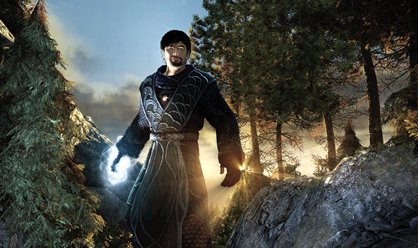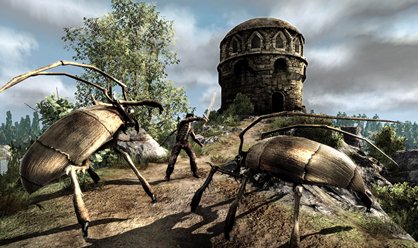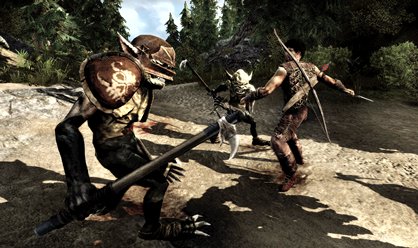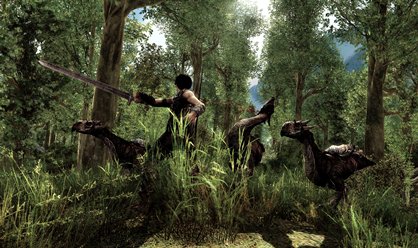First look at ArcaniA: A Gothic Tale
The fourth entry in the RPG series expands to a new audience
If it’s somehow passed you by, the Gothic series consists of what used to be known as ‘real ale’ RPGs, where orcs and goblins stroll a mystical fiddle-de-de land, and dungeons full of unspeakable beasts await smiting from a suitably hirsute hero. All beards and bluster, Gothic was littered with monsters, swords, sorcery, leather, barrels, magic and everything else that makes the genre so derided. Yet despite near Hasselhoff levels of popularity in its native Germany, this hardcore RPG series has yet to make an impact elsewhere, and is largely known for being riddled with serious bugs.

The obvious question is why developer Spellbound is working on ArcaniA, given that Piranha Bytes made the first three instalments. Either way, Piranha Bytes are off the case, and Spellbound are in, selected from some 30 budding developers largely on the basis of a demo of forthcoming orc-’em-up, Ravendale. Development on ArcaniA began around three years ago and has been somewhat chaotic, with key personnel leaving, a number of name changes, and the game almost being canned at one point. With the release date extended, it would appear to be back on track, and is presented in what is referred to as mid-alpha stage. Given the heritage of the series, this must be like stepping into a dead man’s shoes, but the key message is that ArcaniA is still a Gothic game that will remain respectful to the series’ history.
“We wouldn’t want to completely copy Piranha Bytes,” says lead designer Andre Beccu, “because they make their kind of game. We make Spellbound kind of games. We are different culture-wise, what we like, what we are, what we embody. So we just make our kind of game and we try to stay true to the atmosphere, not to disappoint the fans, but at the same time of course we are trying to capture a new audience, so of course changes have to be made.”

Superficially at least, one of the key changes is that of the lead character. The Nameless Hero of the previous three games is no more. ArcaniA continues from the specific ending of Gothic 3 where that hero became king. Instead of shoehorning in a storyline whereby he loses his throne and becomes a weakling (possibly by the triple blows of a coup d’etat, amnesia and plague), Spellbound decided to stamp their mark on the series with an all-new hero, and as such you begin the game 10 years after Gothic 3’s end as a lowly shepherd boy living in the paradise island of Feshyr.
This green and pleasant land largely acts as a tutorial before you’re thrust into the markedly darker island of Argaan, part of the Southern Islands mentioned in the previous games. There you find swamps, jungle, mountains, desert, cities and dungeons, all delivered in a seamless streaming experience, with no loading time between regions. Without getting too technical, ArcaniA looks to have a decent engine, delivering vast panoramas and impressive draw distances. Basically, if you can see the outline of a city on the horizon, it exists and you can walk there.

There shouldn’t be too much aimless wandering about though, as in a buck with tradition, Spellbound is claiming that their game will be smaller than its predecessor, which focus groups have revealed to be simply too unwieldy even for seasoned goblin-fanciers. This Gothic should be more tightly packed, with far less to-ing and fro-ing between quests, and each route allegedly offering new stuff to do. If you know what you’re doing, Spellbound reckons you’d be able to plough through the core quests in 15 to 20 hours. However, if you want to get stuck into the side-quests, you can probably double that again.
As for the story, it’s the time-honoured business of your peaceful idyll being shattered by the ugly spectre of war. Coming home to find your village looted and pillaged, and the aggressors making good their escape by boat, it’s down to you to man up and get involved. There’s also a mysterious love interest, and familiar characters will reappear, including stalwart Diego, who’s similarly intent on revenge. Some of the classic weapons from the series will reappear, enabling melee and ranged combat, along with the trademark fireball and a whiff of magic. Pinpointing the combat as one of the weaknesses of the previous games, sizeable improvements have been made in that area.
Sign up to the GamesRadar+ Newsletter
Weekly digests, tales from the communities you love, and more

“The combat is way more fast-paced,” said Beccu. “In previous versions it was more like waiting until there was a gap in the enemy’s defence. Right now it’s about initiative, choosing strategy, adapting to what kind of enemies there are and changing it on the fly if it doesn’t work.”
While you can specialise in particular areas, Spellbound are being careful to ensure that you don’t paint yourself into a corner, and you should be able to comfortably progress through the game whatever your talents. There’s also the obligatory crafting, enabling you to make a fancy weapon or simply knock up a delicious feast. And you may have to appease the Gods of Earth, Wind and Fire (or something), choose sides in an epic battle and make some soul-searching moral decisions.


